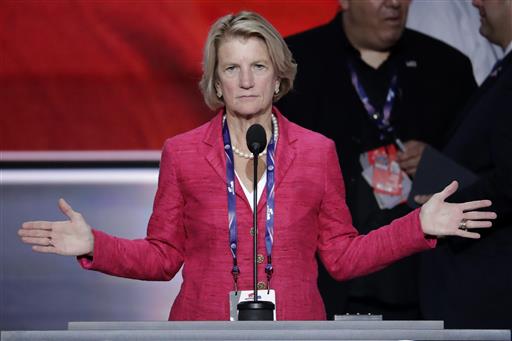Sen. Capito’s $15,000 worth of regulations
July 20, 2016 by Ken Ward Jr.
Sen. Shelley Moore Capito, R-W.Va., looks out from the podium during a sound check before the Republican National Convention in Cleveland, Monday, July 18, 2016. (AP Photo/J. Scott Applewhite)
Last night, West Virginia Sen. Shelley Moore Capito got a prime-time spot speaking at the Republican National Convention in Cleveland, and much of what she talked about was really no surprise. As the Gazette-Mail’s David Gutman reported:
Sen. Shelley Moore Capito assailed the environmental regulations of President Barack Obama and the email practices of former Secretary of State Hillary Clinton in urging the Republican National Convention to “turn the tide” to elect a Republican president in November …
She cited the gaffe infamous in West Virginia when Clinton, in describing her own plan to invest and diversify coalfield communities, said, “We’re going to put a lot of coal miners and coal companies out of business” … “She has promised to devastate communities and families across coal country,” Capito said. “Hillary Clinton understands coal miners and blue collar workers about as well as she understands secure emails.”
Interestingly, though, Sen. Capito also threw this in, as Gutman reported:
Policy-wise, Capito’s focus was largely on federal regulations, which she said cost each American household $15,000 a year, repeating the figure four times. That number comes from the Competitive Enterprise Institute, a conservative think-tank, which admits it is a “back of the envelope” calculation that does not account for any for the benefits of regulations.
For more about that dubious number, check out this Fact Checker post — from 1 1/2 years ago — by Glenn Kessler at The Washington Post:
The factoid comes from an annual report, Ten Thousand Commandments, put out by the Competitive Enterprise Institute, a free-market group founded in 1984 to combat what it considered excessive government regulation. So already you have to take the analysis with a large grain of salt. Indeed, the report is billed as “An Annual Snapshot of the Federal Regulatory State.”
The $15,000 is derived from an estimate that regulations cost at least $1.8 trillion a year … (This number is calculated in a CEI working paper titled “The Tip of the Costberg.”) Then $1.8 trillion is simply divided by the number of American households. Presto, each household “pays” $14,974 annually in a hidden regulatory tax.
The piece continues:
… There is one huge element missing—the benefit side of the analysis. The report concedes that the $1.8 trillion figure purposely does not subtract any potential benefits from regulations. But that’s unbalanced. Every regulations has costs—but also benefits.
Look at cars, for example. Seat belts are a regulation, but they also result in fewer deaths, which is presumably a benefit. Higher fuel-economy standards raise the initial cost of a car, but also result in savings on gasoline over time.
Or, look at mine safety and health regulations. Those have costs, too. But what about the benefits? Would Sen. Capito want those rules to be talked about only in terms of their costs — or would she believe that the benefits to miners and their families in avoided injuries, disease and death should be part of the discussion?
The Fact Checker concluded that, without such analysis — or at least a caveat that the benefits weren’t included — the $15,000-per-household figure deserves a rating of ” Two Pinocchios,” which they define as:
Significant omissions and/or exaggerations. Some factual error may be involved but not necessarily. A politician can create a false, misleading impression by playing with words and using legalistic language that means little to ordinary people. (Similar to “half true.”)

 Subscribe to the Coal Tattoo
Subscribe to the Coal Tattoo
